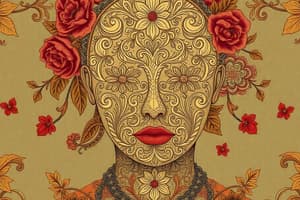Podcast
Questions and Answers
According to Socrates, what is the most important aspect of life?
According to Socrates, what is the most important aspect of life?
- Maintaining physical health and fitness.
- The state of an individual's soul. (correct)
- Accumulation of wealth and property.
- Achieving political power and influence.
Which of the following best describes the Socratic method?
Which of the following best describes the Socratic method?
- Introspection to gain self-knowledge. (correct)
- Accepting established beliefs without questioning.
- Relying on sensory experiences to acquire knowledge.
- External observation of others to understand behavior.
How did Plato describe the soul's components?
How did Plato describe the soul's components?
- Appetitive, rational, and spirited. (correct)
- Rational, spiritual, and physical.
- Physical, emotional, and intellectual.
- Conscious, subconscious, and unconscious.
In Plato's Theory of Forms, what distinguishes the 'real' world from the physical world?
In Plato's Theory of Forms, what distinguishes the 'real' world from the physical world?
What is the primary function of the 'rational' part of the soul, according to Plato?
What is the primary function of the 'rational' part of the soul, according to Plato?
Which method involves self-examination of one's thoughts and feelings?
Which method involves self-examination of one's thoughts and feelings?
Which of the following is the most accurate description of Philosophy?
Which of the following is the most accurate description of Philosophy?
What is the contrast of Introspection?
What is the contrast of Introspection?
According to St. Augustine, what is the ultimate goal of human existence?
According to St. Augustine, what is the ultimate goal of human existence?
How does John Locke's concept of tabula rasa relate to the formation of self?
How does John Locke's concept of tabula rasa relate to the formation of self?
Which of the following best describes David Hume's Bundle Theory of the self?
Which of the following best describes David Hume's Bundle Theory of the self?
According to René Descartes, what is the significance of the statement 'Cogito, ergo sum'?
According to René Descartes, what is the significance of the statement 'Cogito, ergo sum'?
Which philosopher believed that the human mind creates the structure of human experience?
Which philosopher believed that the human mind creates the structure of human experience?
Which of the following contrasts St. Augustine's view of the soul with David Hume's view of the self?
Which of the following contrasts St. Augustine's view of the soul with David Hume's view of the self?
How does the concept of Empiricism, as related to John Locke's philosophy, contrast with René Descartes' approach to understanding the self?
How does the concept of Empiricism, as related to John Locke's philosophy, contrast with René Descartes' approach to understanding the self?
According to Immanuel Kant, what role does the 'self' play in shaping our understanding of the world?
According to Immanuel Kant, what role does the 'self' play in shaping our understanding of the world?
Flashcards
St. Augustine's Self
St. Augustine's Self
Inner, immaterial "I" with self-knowledge.
John Locke's "Tabula Rasa"
John Locke's "Tabula Rasa"
The human mind is a blank slate shaped by experience.
Empiricism
Empiricism
Knowledge originates from sensory experiences.
David Hume's Self
David Hume's Self
Signup and view all the flashcards
Impressions (Hume)
Impressions (Hume)
Signup and view all the flashcards
Ideas (Hume)
Ideas (Hume)
Signup and view all the flashcards
Descartes' Cogito
Descartes' Cogito
Signup and view all the flashcards
Kant's Self
Kant's Self
Signup and view all the flashcards
Introspection
Introspection
Signup and view all the flashcards
Introspection Method
Introspection Method
Signup and view all the flashcards
Philosophy
Philosophy
Signup and view all the flashcards
Socrates' View of the Soul
Socrates' View of the Soul
Signup and view all the flashcards
Socrates' Two Realms of Reality
Socrates' Two Realms of Reality
Signup and view all the flashcards
Know Thyself (Socrates)
Know Thyself (Socrates)
Signup and view all the flashcards
Plato's View of the Self
Plato's View of the Self
Signup and view all the flashcards
Plato's Three Parts of the Soul
Plato's Three Parts of the Soul
Signup and view all the flashcards
Rationalism Theory
Rationalism Theory
Signup and view all the flashcards
Inner Self
Inner Self
Signup and view all the flashcards
Outer Self
Outer Self
Signup and view all the flashcards
Conscious Level
Conscious Level
Signup and view all the flashcards
Preconscious/Subconscious Level
Preconscious/Subconscious Level
Signup and view all the flashcards
Unconscious Level
Unconscious Level
Signup and view all the flashcards
Eliminative Materialism
Eliminative Materialism
Signup and view all the flashcards
Embodied Subjectivity
Embodied Subjectivity
Signup and view all the flashcards
Study Notes
- Introspection originates from Latin: "intro" meaning within, and "spect" meaning look.
- Introspection is the oldest method for collecting data about conscious experience in philosophy and later in psychology.
- The introspection method involves self-examination or inspection of one's thoughts and feelings.
- Looking within oneself to experience one's mental stat is also known as introspection.
- Introspection focuses on human self-reflection and is contrasted with external observation.
- Philosophy: love of wisdom
- "philos" means love, while "sophia" means wisdom
- Philosophy involves the academic study of life's questions and explores various kinds of questions.
- Philosophers use logical analysis and investigate questions, rather than giving opinions or speculating aimlessly.
Socrates
- Socrates was an ancient Greek philosopher
- The state of an individual soul is most important.
- Soul is an immortal entity and the essence of the self.
- The soul strives for wisdom and perfection.
- Reality consists of two realms: physical (changing) and ideal (unchanging, eternal).
- "An unexamined life is not worth living" - Socrates
- Socratic method of "Know Thyself" uses introspection to gain self-knowledge.
Plato
- Plato was an ancient Greek Philosopher
- Self is synonymous with the soul.
- The soul is the most divine aspect of being.
- The soul has three parts: appetitive (sensual and biological needs), rational (reasoning), and spirited (feelings and emotions).
- The Theory of Forms states that physical world is not the "real" world.
- Reality exists beyond the physical.
- The soul is permanent, thus one should give more importance to the should that the physical body
St. Augustine
- Augustine viewed the self as an inner immaterial "I" with self-knowledge and self-awareness
- He believed the human body was both "soul" and "body".
- The body possesses senses (imagination, memory, reason, mind) that allow the soul to experience the world.
- The body is bound to die on earth.
- The soul anticipates living eternally in spiritual bliss in communion with God.
- The goal is to attain communion and bliss with the divine by living a virtuous life.
Rene Descartes
- Rene Descartes was a French Philosopher and "THE FATHER OF MODERN PHILOSOPHY"
- Sought to understand the reasoning process and its relationship to the self.
- “Cogito ergo sum” means "I think, therefore, I am."
- The act of thinking about the self proves the existence of a self.
- The Theory of Rationalism: No rational person doubts their existence as a conscious thinking entity while aware of thinking.
John Locke
- John Locke was an English Philosopher
- The human mind is a "tabula rasa” or blank state.
- Empiricism: knowledge originates from sense experience.
- Experiences shape and mold the self throughout life.
David Hume
- David Hume was a Scottish Philosopher
- The self is not an entity beyond the physical body.
- The self is a series of incoherent impressions received by the senses.
- Experiences are a bundle of different perceptions, known as Bundle Theory.
- Impression: basic sensations.
- Ideas: thoughts and images from impressions.
Immanuel Kant
- Immanuel Kant was a German Philosopher
- The human mind creates the structure of human experience.
- The self is an organizing principle for unified and intelligible experience.
- The self constructs its own reality, creating a familiar and predictable world.
Components of Self
- Inner Self: includes rational, intellect, psychological states, feelings, sensations, pleasures, and pain.
- Outer Self: includes sense in the physical world.
Sigmund Freud
- Sigmund Freud was an Aussie Psychologist
- Levels of Consciousness: conscious, preconscious/subconscious, unconscious
- Conscious: awareness of present perceptions, feelings, thoughts, memories, fantasies.
- Preconscious/Subconscious: data readily brought to unconscious.
- Unconscious: retained data not easily available to consciousness; basic instinctual drives (sexuality, aggressiveness), unfulfilled wishes, childhood fantasies.
- Id: desires and impulses.
- Ego: reality and balance.
- Superego: morality and guilt.
Gilbert Ryle
- Gilbert Ryle was a British Philosopher
- An individual's actions define their concept of self.
- The self is best understood as a pattern of behavior or a tendency to behave in a certain way.
- "I act, therefore, I am."
Paul Churchland
- Churchland was a Canadian Philosopher
- The self is inseparable from the brain (eliminative materialism).
- The physical brain gives the sense of self, not an imaginary mind.
- The mind does not really exist because it cannot be experienced by the senses.
- Theory of Materialism: nothing but matter exists.
Maurice Merleau-Ponty
- Maurice Merleau-Ponty was a french Philosopher
- Self as an embodied subjectivity: the mind and body are intrinsically connected.
- The body is part of the mind and the mind is part of the body.
- Consciousness, the world, and the body are intertwined in perceiving the world.
- All knowledge about the self is based on the "phenomena" of experience.
- "Perception is not merely a consequence of sensory experience; rather it's a conscious experience."
Studying That Suits You
Use AI to generate personalized quizzes and flashcards to suit your learning preferences.



